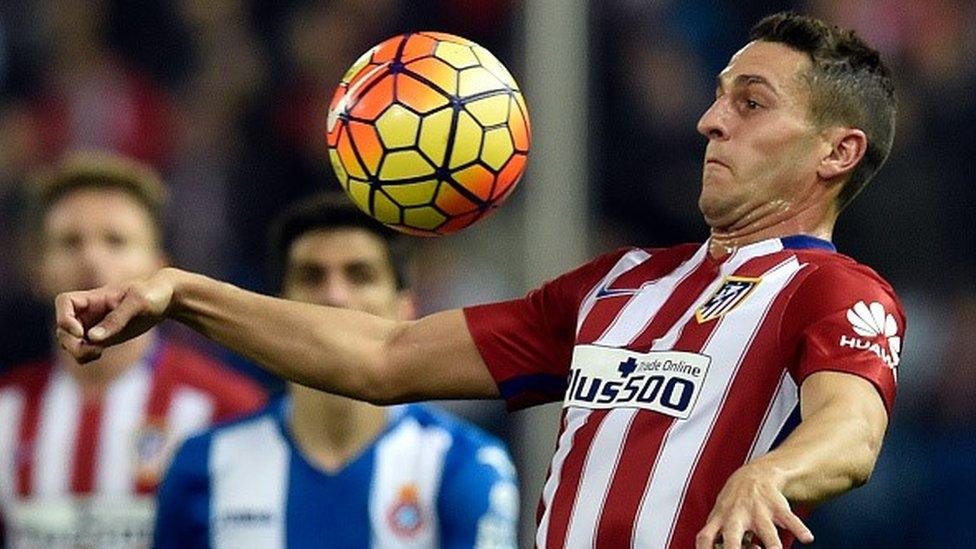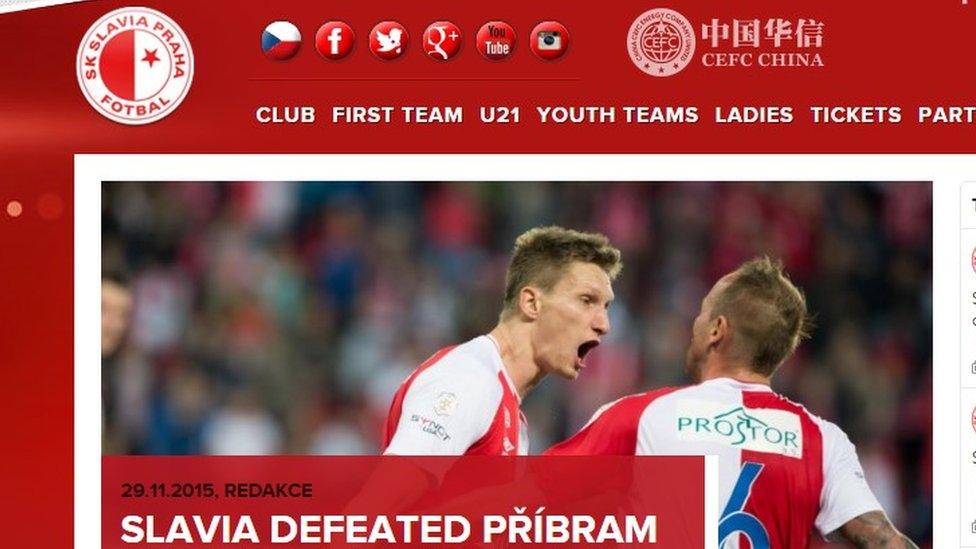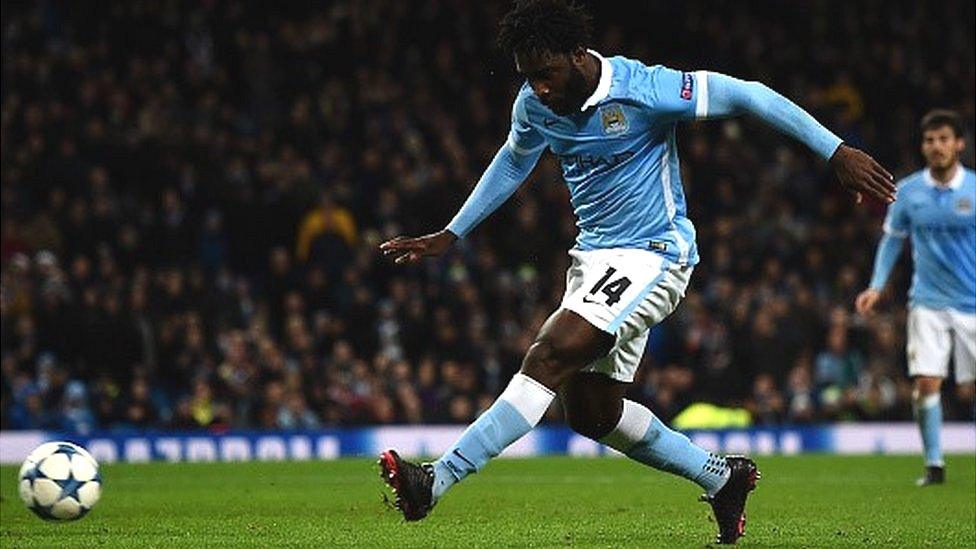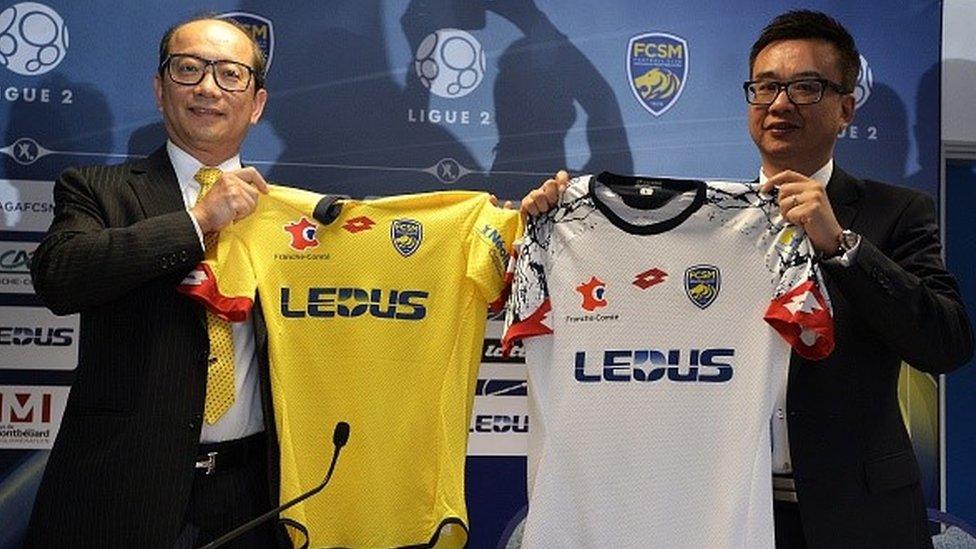China football revolution can be a financial game changer
- Published

Dalian Wanda Group owns a stake in Spanish club Atletico Madrid
When Chinese investors recently decided to acquire a 13% stake in Manchester City's parent firm, it put the country's renewed interest in football firmly in the spotlight.
The world's second largest economy has never been a football powerhouse, qualifying for just one World Cup.
Meanwhile, the population seems more interested in NBA basketball than the sport known in the UK as "the people's game".
But over the past couple of years Chinese investors and firms have quietly been acquiring stakes in football clubs in England, Spain, France, Netherlands and the Czech Republic, while President Xi Jinping has professed a love of the game.
So why are the Chinese now snapping up stakes in European clubs?
Reasons include a national desire to look good on the world stage, developing China's club football and national team, creating Chinese football fan bases, and firms using clubs to build their commercial presence in Europe.
'Acquiring competence'
"China likes to be omnipotent and successful in everything it does," Simon Chadwick, chair in sport business at Coventry University Business School, tells me.
"One thing they currently don't do particularly well at is football, the global game. China wants to ascend to a position where it is respected globally as part of the international football community."
He says President Xi has come out as a big football fan, and that by 2025 China wants to have a domestic sports industry worth $850bn (£564bn). Optimistic estimates put the current entire global sports economy at $400bn.


The Slavia Prague website shows the logo of its Chinese owners CEFC China
CASE STUDY 1: SLAVIA PRAGUE
Slavia Prague, one of the most historic names in Czech football, was heavily in debt, and near financial collapse before the start of this season.
In September, China Energy Company Limited (CEFC) bought roughly 60% of the club for an undisclosed sum, with Czech businessman Jiri Simane buying around 40%.
The CEFC football purchase was part of a bigger investment move by the firm into the Czech Republic. In 2014 it had decided to establish a major European base in Prague, buying two historic properties in the city, and also a number of businesses.
Following Slavia's previous woes, CEFC has managed to keep top players like Czech national forward Milan Skoda at the club, and there are plans to buy other top domestic players, much to the approval of fans.
Slavia just avoided relegation last season. Now it sits fifth in the table and there is talk of qualifying for next season's Europa League.

"This would be market-making on an unprecedented scale in sport," says Prof Chadwick. "China would then be able to bid for the football World Cup, and the ultimate aim would then be to win it.
"But they need to learn more about football - that is crucial. With these club purchases, they have been going about acquiring competence."
Mix of influences
Chinese parents traditionally prefer their children to enter a profession rather than sport, says Prof Chadwick, so in order to improve playing standards the country has been building US-style soccer campuses.
These enable talented youngsters to improve their football skills, while at the same time also learning and potentially preparing to enter university.
Prof Chadwick says in establishing a domestic football league, China has been influenced by Japan's J-League. Before its creation, in 1993, the Japanese national team did not qualify for World Cups, but since 1998 has been in five in a row.


The Man City investment has caught the attention of football fans and the media
Chinese investment in European teams
CMC/Citic Capital - 13% stake in City Football Group (Man City parent firm)
Rastar Group - 56% stake in Spanish club Espanyol
Dalian Wanda Group - 20% stake in Spanish club Atletico Madrid
CEFC China Energy Company - 60% stake in Czech club Slavia Prague
Ledus - complete ownership of French club Sochaux
United Vansen International Sports Company - majority shareholder in Dutch club ADO Den Haag

This combination of US and Japanese influences, has now been joined by acquiring knowledge from European football clubs.
"Man City is not a random buy," says Prof Chadwick. "They have got the Etihad Campus, which is the model the Chinese want to follow."
Ownership of European clubs also provides a voice at European confederation Uefa, which can be useful when decisions are made about where to stage future World Cups, he says.
'Scale and resources'
Meanwhile, Gu Xin, from Beijing-based sports marketing firm Yutang Sports, says that Chinese investors can also see potentially rich economic returns from European football.
He says owning stakes in the likes of Atletico Madrid could potentially open the doors to Chinese players appearing in club first teams in Europe.
"As a result, there could be more Chinese fans of the clubs, which means larger commercial values for the clubs in the Chinese market.
"The companies could [also] then earn money by transferring international players [from the European teams] to Chinese teams. This is another very profitable revenue stream."


Sochaux have not had a great start to the season
CASE STUDY 2: SOCHAUX
Fans in France were surprised - and rather sceptical - when Hong Kong-listed Ledus bought second division Sochaux from Peugeot for €7m (£5m) in July. Ledus is an electrical components manufacturer specialising in the production of LED-based lighting systems.
Sochaux is one of the oldest professional clubs in France, and had always been owned by Peugeot, which founded the team in 1928. For local residents, the club and the firm were a family.
French media observers say it is unlikely that Ledus will be able to build a fan base in China around the club, rather that the new owners are using Sochaux as a vehicle to develop the Ledus brand in France and Europe.
After a poor start to the season, the club currently sits third from bottom of the second tier, and fans are starting to ask questions about what the Chinese strategy for Sochaux actually is.
The Chinese ownership says that Ledus is in Sochaux for the long term, and that the club will achieve its goal of getting back into Ligue 1.

Prof Chadwick also says those Chinese businesses that follow the wishes of their national president and support football may be looked upon favourably by the authorities.
And there are signs that investment by firms in the Chinese domestic football market is creating progress there.
He points to club Guangzhou Evergrande - 60% owned by Evergrande Real Estate and 40% by Jack Ma's Alibaba - which has won the Asian Champions league two times in past three years.
"I think China can win a World Cup," he says. "It has the resources, scale, and and state backing to fast forward 150 years of football development into 10 years."